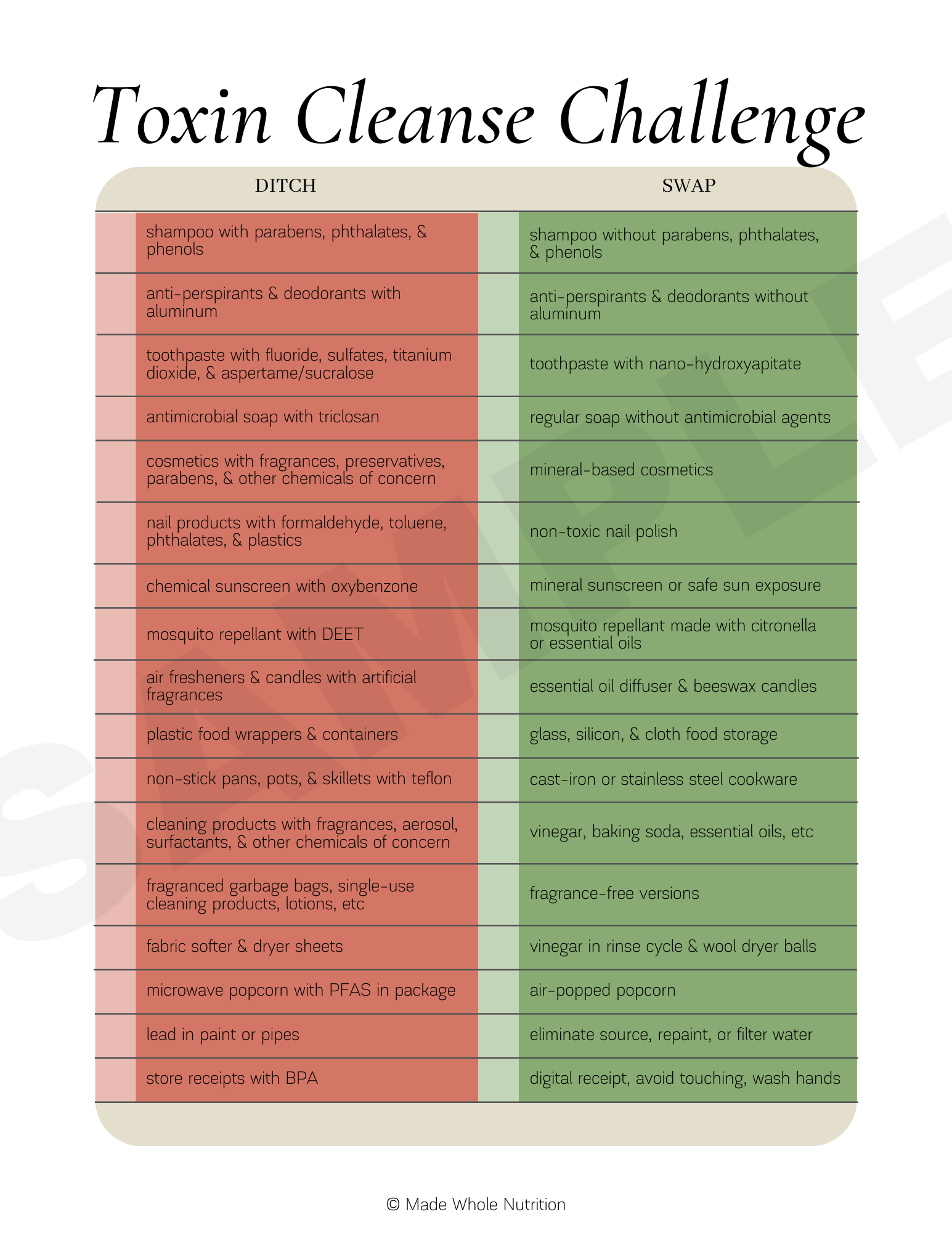TOXIN CLEANSE CHALLENGE: how many of these swaps can you make?
DITCH: shampoo with parabens, phthalates, & phenols
STOCK: shampoo without parabens, phthalates, & phenols
DITCH: anti-perspirants & deodorants with aluminum
STOCK: anti-perspirants & deodorants without aluminum
DITCH: toothpaste with fluoride, sulfates, titanium dioxide, & aspertame/sucralose
STOCK: toothpaste with nano-hydroxyapitate
DITCH: antimicrobial soap with triclosan
STOCK: regular soap without antimicrobial agents
DITCH: cosmetics with fragrances, preservatives, parabens, & other chemicals of concern
STOCK: mineral-based cosmetics
DITCH: nail products with formaldehyde, toluene, phthalates, & plastics
STOCK: non-toxic nail polish
DITCH: chemical sunscreen with oxybenzone
STOCK: mineral sunscreen or safe sun exposure
DITCH: mosquito repellant with DEET
STOCK: mosquito repellant made with citronella or essential oils
DITCH: air fresheners & candles with artificial fragrances
STOCK: essential oil diffuser & beeswax candles
DITCH: plastic food wrappers & containers
STOCK: glass, silicon, & cloth food storage
DITCH: non-stick pans, pots, & skillets with teflon
STOCK: cast-iron or stainless steel cookware
DITCH: cleaning products with fragrances, aerosol, surfactants, & other chemicals of concern
STOCK: vinegar, baking soda, essential oils, etc
DITCH: fragranced garbage bags, single-use cleaning products, lotions, etc
STOCK: fragrance-free versions
DITCH: fabric softer & dryer sheets
STOCK: vinegar in rinse cycle & wool dryer balls
DITCH: microwave popcorn with PFAS in package
STOCK: air-popped popcorn
DITCH: lead in paint or pipes
STOCK: eliminate source, repaint, or filter water
DITCH: store receipts with BPA
STOCK: digital receipt, avoid touching, wash hands
Are you a health educator that wants to use this content with your clients? Customize the handout template in less time than it would take to even think about hiring a graphic designer.
References
Giuliano, C. A., & Rybak, M. J. (2015). Efficacy of triclosan as an antimicrobial hand soap and its potential impact on antimicrobial resistance: a focused review. Pharmacotherapy, 35(3), 328–336. https://doi.org/10.1002/phar.1553
Harley, K. G., Kogut, K., Madrigal, D. S., Cardenas, M., Vera, I. A., Meza-Alfaro, G., She, J., Gavin, Q., Zahedi, R., Bradman, A., Eskenazi, B., & Parra, K. L. (2016). Reducing Phthalate, Paraben, and Phenol Exposure from Personal Care Products in Adolescent Girls: Findings from the HERMOSA Intervention Study. Environmental health perspectives, 124(10), 1600–1607. https://doi.org/10.1289/ehp.1510514
Nail Care Products. US Food and Drug Association. Retrieved from: https://www.fda.gov/cosmetics/cosmetic-products/nail-care-products
Panico, A., Serio, F., Bagordo, F., Grassi, T., Idolo, A., DE Giorgi, M., Guido, M., Congedo, M., & DE Donno, A. (2019). Skin safety and health prevention: an overview of chemicals in cosmetic products. Journal of preventive medicine and hygiene, 60(1), E50–E57. https://doi.org/10.15167/2421-4248/jpmh2019.60.1.1080
Paszynska, E., Pawinska, M., Enax, J., Meyer, F., Schulze Zur Wiesche, E., May, T. W., Amaechi, B. T., Limeback, H., Hernik, A., Otulakowska-Skrzynska, J., Krahel, A., Kaminska, I., Lapinska-Antonczuk, J., Stokowska, E., & Gawriolek, M. (2023). Caries-preventing effect of a hydroxyapatite-toothpaste in adults: a 18-month double-blinded randomized clinical trial. Frontiers in public health, 11, 1199728. https://doi.org/10.3389/fpubh.2023.1199728
Salonen, H., Salthammer, T., Castagnoli, E., Täubel, M., & Morawska, L. (2024). Cleaning products: Their chemistry, effects on indoor air quality, and implications for human health. Environment international, 190, 108836. https://doi.org/10.1016/j.envint.2024.108836
Sanajou, S., Şahin, G., & Baydar, T. (2021). Aluminium in cosmetics and personal care products. Journal of applied toxicology : JAT, 41(11), 1704–1718. https://doi.org/10.1002/jat.4228
Schlummer, M., Sölch, C., Meisel, T., Still, M., Gruber, L., & Wolz, G. (2015). Emission of perfluoroalkyl carboxylic acids (PFCA) from heated surfaces made of polytetrafluoroethylene (PTFE) applied in food contact materials and consumer products. Chemosphere, 129, 46–53. https://doi.org/10.1016/j.chemosphere.2014.11.036 Retrieved from: https://pubmed.ncbi.nlm.nih.gov/25496745/



